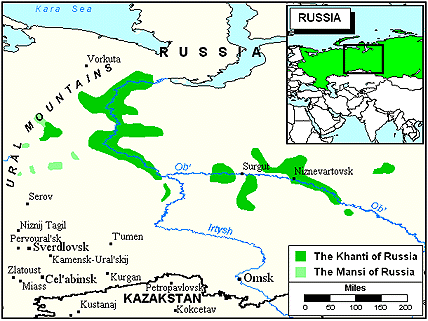|
|
Prayer Profile
The Khanti of Russia
![[IMAGE]](../images/0104.jpg) The Khanti of Russia live in western Siberia, just to the west of the Ural Mountains in the area drained by the Ob River. They are known by a variety of other names, including As-iakh, Hante, and Ostyak. Their culture and language are very similar to those of the neighboring Mansi people. The Khanti language is also closely related to Hungarian.
The Khanti of Russia live in western Siberia, just to the west of the Ural Mountains in the area drained by the Ob River. They are known by a variety of other names, including As-iakh, Hante, and Ostyak. Their culture and language are very similar to those of the neighboring Mansi people. The Khanti language is also closely related to Hungarian.
The Khanti once lived to the southwest of their current homeland and belonged to the same ethnic group as the Hungarians. Around A.D. 500, after being forced to leave the region, the Khanti migrated to the northeast and settled near the Ob River. They came under Russian control in the sixteenth century. Russian settlers flooded the region, making the Khanti a tiny minority in their own land. During that time, Russian merchants cheated them and taxes became unbearable. After the Communists took over, taxes were lowered substantially and education was greatly improved.
What Are Their Lives Like?
In the southern parts of the Khanti homeland, the land is covered by marshes and forests. Further north, the forests thin into the stark, treeless Arctic tundra. The climate is cold and harsh, and in the tundra regions, temperatures sometimes dip to -60 degrees Fahrenheit.
Traditionally, most Khanti living in the northerly regions herded reindeer for a living. In the southern areas, they hunted and fished; and in central regions, they practiced a combination of these activities. Many Khanti also were involved in fur trading.
After the Communist Revolution of 1917, numerous Khanti were moved onto collective settlements where some of them continued to hunt, fish, or herd reindeer. Other settlements focused on agriculture or cattle herding, activities foreign to the Khanti. Fur trading was still an important economic activity. In recent years, some Khanti have abandoned their traditional occupations, adopting a more typical Russian lifestyle.
Before 1917, the Khanti lived a semi-nomadic lifestyle, inhabiting one camp in the summer and moving to another for the winter. The preferred dwelling was the yurt, a type of tent. However, most of the Khanti now live in small houses in the villages or apartments in the towns and cities of the area.
What Are Their Beliefs?
Although most Khanti converted to Russian Orthodox Christianity, they never completely embraced Christianity. They continued to follow their traditional animistic religion (the belief that non-human objects have spirits). This religion has many gods, great and small, with the most important being called Numi-Torem. The Khanti also worship a variety of household deities. Khanti consider the bear sacred and honor it almost like a god. They worship the gods of various parts of nature, including rivers and forests. They also often participate in the worship of dead ancestors.
Traditionally, the Khanti believed that men had five distinct souls and that women had four. Each soul inhabited a different part of the body and could take on different forms, such as those of a bird or other animal. Supposedly, a man could actually kill himself hunting if he happened to shoot an animal that was one of his souls.
During the days of the Communist rule, many Khanti became atheists or simply rejected any formal association with any religion.
What Are Their Needs?
The Khanti have long been forced to adopt Russian culture, and many of them have been assimilated into Russian society. With nearly a fourth of all Khanti speaking Russian as their first language, they are in danger of eventually losing their identity as a distinct people group.
There are no known evangelical Christians among the Khanti. At the beginning of the twentieth century, missionary influence caused many to turn to Christ. However, today there is little evidence of this work. The Khanti need laborers and much prayer to be reached with the Gospel.
Prayer Points
- Ask the Lord to send forth laborers willing to adapt to the harsh Siberian climate to work among the Khanti.
- Ask the Holy Spirit to grant wisdom and favor to the missions agency that is currently targeting the Khanti.
- Pray that the entire Bible, the Jesus film, and other evangelistic tools will be translated into the Khnati language.
- Pray that God will reveal Himself to the Khanti through dreams and visions.
- Pray that God will save Khanti leaders who will share the love of Jesus with their own people.
- Take authority over the spiritual principalities and powers that are keeping the Khanti bound.
- Ask God to raise up prayer teams who will begin breaking up the soil through worship and intercession.
- Ask the Lord to bring forth a triumphant Khanti church for the glory of His name!

Statistics
Latest estimates from the World Evangelization Research Center.
THE PEOPLE
- People name: Khanti
- Country: Russia
- Their language: Khanti (Ostyak)
- Population:
- Largest religion:
- Christians: 4%
- Church members: 891
- Scriptures in their own language: Portions
- Jesus Film in their own language: None
- Christian broadcasts in their own language: None
- Mission agencies working among this people: 1
- Persons who have heard the Gospel: 6,500 (29%)
- Persons who have never heard the Gospel: 15,800 (71%)
THEIR COUNTRY
- Country: Russia
- Population:
- Major peoples in size order:
- Major religions:
- Number of denominations: 50
© Copyright 1997
Bethany World Prayer Center
This profile may be copied and distributed without obtaining permission
as long as it is not altered, bound, published
or used for profit purposes.
![[HOME BUTTON]](../graphics/home.jpg)
![[CALENDAR BUTTON]](../graphics/calico.jpg)
![[LIST BUTTON]](../graphics/listico.jpg)
[Home]
[Calendar]
[Country List]
|